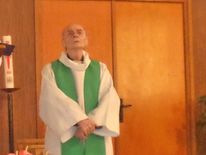The second assailant who slit the throat of a French priest at a church in Normandy has been identified as Abdelmalik Petitjean.
Petitjean, who is believed to be aged 20 and from France's Savoie region stormed the church in Saint-Etienne-du-Rouvray with 19-year-old Adel Kermiche during a service on Tuesday.
Fr Jacques Hamel, three nuns and two churchgoers were taken hostage before police shot dead the two terrorists as they ran from the building shouting "Allahu Akbar".
The 19-year-old was wearing an electronic tag at the time of the attack
Petitjean was identified through an ID found at Kermiche's home, French media reported. He is believed to have been on a watch list like Kermiche.
DNA tests are being carried out on the second attacker to confirm his identity, judicial sources told Reuters.
Security forces in France are under scrutiny after it emerged Kermiche was under house arrest and wearing a tag, having twice tried to travel to Syria.
His tag was turned off for a few hours each morning to allow him to leave home - and it was in this time that Kermiche and Petitjean slit the 86-year-old's throat.
Father Jacques Hamel was ordered to kneel before he was killed
A third person, believed to be a 17-year-old male, is in custody in connection with the attack.
Petitjean was identified as churches across France held memorial services for the priest.
Meanwhile, Interior Minister Bernard Cazeneuve said France would bolster the operational reserve of its police force after 2,500 people asked to join up in the days after 84 people died in an IS-inspired attack on Bastille Day.
He also said more of the country's 10,000-strong Operation Sentinel anti-terror forces would be deployed to areas outside Paris following the lorry attack in Nice and the killing in Normandy.
He spoke after former president Nicolas Sarkozy accused Mr Hollande of being "out of touch" and called for detention or electronic tagging of all suspected Islamist militants - even if they have committed no offence.
But Mr Cazeneuve said: "We can't step back from the rule of law to protect the rule of law.
"If we abandon constitutional principles to protect that which we hold most dear - our liberty - we will be giving a victory to the terrorists."
The killing came just two weeks after the Bastille Day attack and is the latest of more than a dozen attacks attributed to Islamic extremists in France over the past two years.
Mr Hollande met with France's main religious leaders on Wednesday morning before attending a defence council and a cabinet meeting.
After the meeting, Paris Archbishop Cardinal Andre Vingt-Trois urged Catholics not to "enter the game" of IS that "wants to set children of the same family in opposition to each other".
French authorities are again trying to establish whether the Normandy attackers were part of a network after Islamic State claimed its "soldiers" were responsible.
The body of one of the two men who stormed the church
Paris prosecutor Francois Molins said Kermiche, 19, first came to the attention of anti-terror officials when a family member alerted them that he was missing in March 2015.
German officials arrested him and found he was using his brother's identity while trying to travel to Syria.
He was released under judicial supervision, but in May fled to Turkey where he was again arrested and returned to France. He was then held in custody until March this year.
A neighbour of Kermiche in Saint-Etienne-du-Rouvray, who gave his name only as Redwan, said he had known who was responsible as soon as he heard about the attack.
"I was told that an attack occurred and I knew it was him, I was sure," he said.
"He said to us 'Yes, I tried (to go to Syria).' Then we tried to bring him to his senses, every time we did it and every time he was bringing in a verse from the Koran, he was inventing things."
An 86-year-old worshipper remains in hospital in a serious condition after suffering knife wounds during the hour-long siege.
He had been forced to record the killing of the priest before he was slashed by the attackers.




